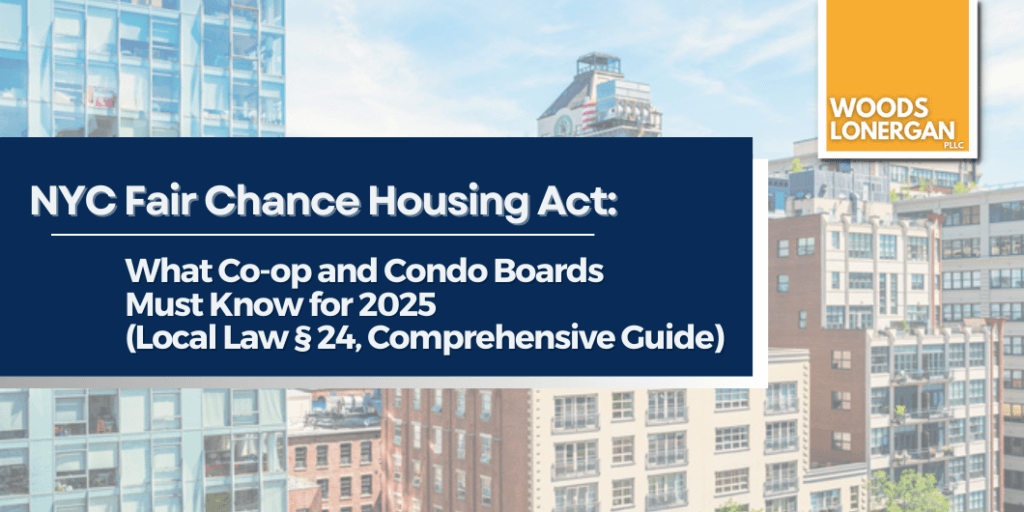
On January 1st, 2025, Local Law § 24, or the Fair Chance Housing Act, will significantly impact housing application procedures and board governance for cooperative and condominium boards in New York City.
This legislation applies to all housing providers, including co-ops, condos, and HOAs, affecting their admissions practices and background check procedures.
It covers cooperative boards evaluating candidates for membership and extends to condominium and HOA boards using application reviews and interviews for their Right of First Refusal.
The Act amends the Administrative Code of New York City to address housing discrimination based on criminal history, aiming to protect over 750,000 NYC residents who have reported housing denials.
Woods Lonergan PLLC’s NYC cooperative and condominium attorneys serve as general counsel to numerous boards throughout New York City, helping them navigate complex regulatory changes like the Fair Chance Housing Act.
Our attorneys provide clear, practical guidance to help boards implement compliant policies and procedures. For personalized guidance on Local Law 24 compliance or other cooperative and condominium matters, please contact our New York City housing cooperative lawyers at (212) 684-2500.
This comprehensive guide outlines key requirements of the Fair Chance Housing Act and provides essential compliance strategies to prepare cooperative and condominium boards for these changes in 2025.
Key Provisions of Local Law § 24
Unlawful Discriminatory Practices
This legislation aims to address housing discrimination affecting over 750,000 NYC residents reporting housing denials, which makes it unlawful for cooperative and condo boards in NYC to enact blanket policies to refuse to sell, rent, or approve housing accommodations based on an individual’s criminal history, with exceptions only for “reviewable criminal history.”
Reviewable Criminal History
Under Local Law § 24, only these criminal records may be considered:
- Convictions requiring sex offender registration
- Misdemeanor convictions within 3 years of release or sentencing
- Felony convictions within 5 years of release or sentencing
Application Process Requirements
- Background Check Timing: Only after this preliminary approval or “commitment” is made can the co-op board conduct a criminal background check on the applicant.
- Notification Requirements: Boards must provide applicants with a notice and copy of Local Law § 24.
- Applicant Rights: Applicants must receive a copy of the background check and have the opportunity to submit corrections or mitigating information.
Application Process Under Local Law § 24
Initial Application Review
Boards must establish and implement new governance policies that require a two-step review process:
- Primary Assessment
- Review credit score and financial qualifications
- Evaluate income requirements
- Assess tenant history
- Consider other standard application criteria
- Document the review process thoroughly
- Criminal Background Review
- If preliminary approval is granted and a criminal background check reveals reviewable history, boards must:
- Conduct an individualized assessment of the criminal history
- Provide the applicant with:Copies of all supporting documents reviewed
- Document all steps of the review process
- Document all steps of the process
The Fair Housing Act “Legitimate Business Interest” Requirement
While Local Law § 24 does not explicitly define this term, it requires housing providers to articulate a clear connection between the applicant’s criminal history and a genuine concern related to the property or other residents’ well-being. The individualized assessment process suggests that unofficial or blanket policies against all applicants with criminal histories would not be considered legitimate under this new law.
Important Considerations Relating to Application Denials
Board liability protection and risk management are critical considerations when implementing these new requirements.
- Violence Exception: Local Law § 24 allows consideration of physical violence or acts that could affect the health, safety, or welfare of other residents.
- Insurance Implications: Insurance may defend against lawsuits but likely won’t cover damages awarded against directors.
- Liability Shield: Housing providers can choose not to conduct background checks and be shielded from liability under Local Law § 24.
Enforcement and Penalties
Applicants who believe they were wrongly denied housing due to illegal discrimination have two options:
- File a complaint with the NYC Commission on Human Rights
- File a private lawsuit
Local Law 24 likely requires housing providers to change their policies, provide compensation, or pay penalties. To avoid errors that could result in legal action, penalties, or fines, it is crucial to have clear policies in place before the law takes effect on January 1, 2025.
Recommendations for Cooperative and Condo Boards
The Fair Chance Housing Act represents a significant shift in how NYC boards must handle housing applications. To ensure successful implementation and protect your community, boards should take these essential steps:
Immediate Actions Required
- Begin developing compliant application procedures now to meet the January 1, 2025 deadline
- Review and revise all existing application materials and interview protocols
- Establish clear documentation systems for application reviews
- Schedule comprehensive training for board members and staff
Strategic Planning
- Consider whether to conduct criminal background checks, weighing liability protection against community safety needs
- Develop protocols for handling sensitive applicant information
- Create templates for required notices and written explanations
- Implement safeguards to prevent discriminatory practices
Risk Management
- Document all board decisions regarding policy development
- Maintain detailed records of application processes
- Ensure consistent application of policies across all candidates
- Seek legal counsel for policy review before implementation
For a comprehensive overview of other critical regulatory deadlines and compliance requirements affecting NYC cooperative and condominium boards in 2025, see our New York City Coop and Condo Board Governance Alert: Key Regulatory and Local Law Compliance Deadlines for 2025.
Woods Lonergan PLLC’s New York condominium and cooperative attorneys currently serve as general counsel to boards of directors and managers of numerous cooperatives, condominiums, and homeowners associations throughout New York City, Brooklyn and Queens.
We provide comprehensive legal services including board governance guidance, regulatory compliance assistance, policy development, financing and vendor agreement negotiations, election counseling, and strategic counsel in complex board litigation.
Our expertise extends to day-to-day corporate counseling, bylaw modifications, managing agent contracts, and assistance with application procedures to help housing providers navigate complex requirements while protecting their communities’ interests.
For personalized guidance on Local Law § 24 or any other matters related to cooperative and condominium law, contact us online or call our cooperative condominium law firm at (212) 684-2500.
NYC Fair Chance Housing Act FAQs for Co-op and Condo Boards
Basic Implementation Questions
When does the law take effect?
The Fair Chance Housing Act becomes effective January 1, 2025.
Who must comply with this law?
All NYC housing providers, including cooperative boards, condominium boards, and HOAs that use applications and interviews in their approval process.
What is “reviewable criminal history”?
Only these criminal records may be considered:
- Sex offender registry convictions
- Misdemeanors within 3 years of release/sentencing
- Felonies within 5 years of release/sentencing
Application Process
When can boards conduct criminal background checks?
Only after completing the initial application review and making a preliminary approval based on other factors.
What factors should be reviewed first?
Boards must review all relevant factors except criminal history, including:
- Credit score
- Income
- Tenant history
- Other standard application criteria
How should boards handle application denials?
Boards must:
- Conduct an individualized assessment
- Provide copies of supporting documents
- Issue a written explanation linking the decision to legitimate business interests
- Explain how applicant’s supporting information was considered
Advanced Implementation
What constitutes a “preliminary approval”?
The board must complete its standard application review and make an initial commitment to approve the applicant before conducting any criminal background check.
How should boards modify interview procedures?
Boards must avoid asking about criminal history during interviews and should document all questions asked to demonstrate compliance.
What records must boards maintain?
Detailed documentation of:
- Application review process
- Preliminary approval decision
- Criminal background check (if conducted)
- Written explanations for any denials
- Communications with applicants
Coop Condo Board Member Fiduciary Duties
How do fiduciary duties relate to Local Law § 24 compliance?
Board members must exercise their Duty of Care by:
- Developing and implementing compliant application procedures
- Making informed decisions about background check policies
- Ensuring proper documentation of all housing decisions
- Protecting the community from potential liability
What specific documentation supports fiduciary compliance?
Board members should maintain detailed records of:
- Application review processes
- Board decisions and rationales
- Training completion by board members and staff
- Communications with applicants regarding criminal history
- Individual assessments when conducted
How should boards balance their fiduciary duties with the new law’s requirements?
Boards must:
- Consider both resident safety and legal compliance
- Document decision-making processes thoroughly
- Seek legal counsel when needed
- Ensure consistent application of policies
- Maintain confidentiality of applicant information
Local Law 24 Liability Considerations
What are the liability protections?
Boards can choose not to conduct background checks and receive liability protection under the law.
How can boards demonstrate a “legitimate business interest”?
Must show clear connection between specific criminal history and genuine concerns about property or resident safety.
What are the consequences of violations?
- Policy changes required
- Potential compensation to applicants
- Monetary penalties
- Legal fees and costs
Safety and Security
Can boards still consider violent crimes?
Yes, the law permits consideration of physical violence or acts that could affect resident safety and welfare.
How should boards handle multiple applicants?
Each applicant must be evaluated individually, with criminal history considered only after preliminary approval.
Coop Condo Board Governance Policy Development
What should be included in compliant policies?
- Clear application review procedures
- Documentation requirements
- Notice and communication protocols
- Training requirements for board members
- Process for individualized assessments
What training is needed?
Board members and staff should be trained on:
- New application procedures
- Documentation requirements
- Proper communication protocols
- Legal compliance requirements
- Fair housing obligations
